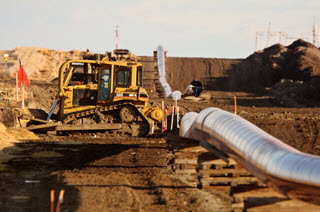PennEast’s Natural Gas Pipeline Project
 PennEast’s natural gas pipeline project has been stalled in the Northeast. The project is estimated to cost $1.13 billion dollars and it will span a total of 118 miles. It will go from Luzerne County, PA. to Mercer County, NJ. They anticipate a service date of June 1, 2018.
PennEast’s natural gas pipeline project has been stalled in the Northeast. The project is estimated to cost $1.13 billion dollars and it will span a total of 118 miles. It will go from Luzerne County, PA. to Mercer County, NJ. They anticipate a service date of June 1, 2018.
However, after reviewing the PennEast pipeline, FERC (Federal Energy Regulatory Commission), has decided to postpone the project from December 16, 2016 until Feb. 17, 2017. This is the second major delay for the project. The project itself has been met with a lot of opposition from residents, landowners, and key government agencies.
Why Did FERC Delay PennEast’s Pipeline?
Contents
Route And Environmental Issues
The route that PennEast wants to use to build the gas pipeline has created an issue for bipartisan and environmental agencies. FERC also claims that the maps that PennEast is using to plan the pipeline are both outdated and incorrect. They claim that:
FERC also sent the company a substantial request for 46 sets of new data and demanded 34 corrections to PennEast’s application to build a 118-mile gas pipeline through New Jersey and Pennsylvania. In several cases, FERC notes that PennEast’s maps are outdated, incorrect, and incomplete.
Click here to see the rest of this article.
As much as PennEast would like to move forward with the pipeline, there is too much opposition. FERC claims that the plan for the pipeline has not been thoroughly conducted. The route for the pipeline would significantly damage protected land that has high-quality streams, wildlife, and wetlands. This is met with major opposition from government agencies that include: U.S. Fish & Wildlife Service, U.S. Environmental Protection Agency, and the New Jersey Department of Environmental Protection.
The effect that this pipeline would have on this protected land would be catastrophic. Landowners would lose property value. Additionally, residents in the Northeast are more environmentally conscious. Highly appreciated areas of their state would devastated by the pipeline. Many environmental groups claim that the damage to the environment would still be disastrous even if the route were to be altered. Jeff Tittel, the director of the Sierra Club of New Jersey says:
As Tittel said (and echoed by hundreds of comments from local environmental groups), the FERC review has fatal flaws. “Even with making this minimal changes, this project will still will be an environmental nightmare. They know that the FERC DEIS is fatally flawed and they cannot meet the regulatory requirements for water quality permits. That is the only reason they are changing the route so they can make it easier to get permits, not protect landowners,” he said.
Click here to see the rest of this article.
Self-Interest
Many utility companies have already signed contracts with PennEast. Their owner companies also happen to be the owners of PennEast. The New Jersey Division of Rate Counsel claims that these are self-dealing contracts that are truly unfair to consumers in the area.
Clearly, this project only serves the gas companies affiliated with PennEast, which has been flat-out misleading to the public throughout its review process.
Click here to see the rest of this article.
Option To File Comments
Finally, PennEast decided to change their route. They announced this on Sept. 23rd. Because of this, FERC reopened the option for landowners and others affected by the pipeline to file comments about their thoughts on the new pipeline route. The option to file comments opened on Nov. 4th and are closed on Dec. 5th. The public can comment on what is now PennEast’s 33rd route change proposal. However, many believe that PennEast is not addressing the devastation that they would cause to the environment. In fact, many believe that they are just shifting it from one area to another. Residents and agencies alike believe that there is no appropriate route for a pipeline that is unnecessary. If you are against the pipeline be sure to voice your opinion.
The public now has another chance to voice its opposition. All concerned citizens – not just affected landowners, as FERC tries to imply – should use this new comment period to continue to point out the issues with the route changes and the lingering fundamental flaws with the DEIS that still haven’t been addressed,” continued Waltman. “Unfortunately, 30 days is not nearly enough time for a substantive review of such a massive project, but the outpouring of comments we have seen is clearly working,” said Waltman.
Click here to see the rest of this article.
If you feel like commenting on PennEast’s new DEIS, please go to:
https://ferconline.ferc.gov/QuickComment.aspx
or
http://elibrary.ferc.gov/idmws/file_list.asp?accession_num=20161104-3006
In addition, PA does not require PennEast to pay a property tax. Therefore, the burden of the cost falls on the shoulders of PA residents. They will have to pay for any emergencies that might happen and pay for any environmental issues that would arise from the pipeline. In the following article by The MORNING Call, they discuss this in further detail:
Pennsylvania’s property tax exemption, critics say, will leave municipalities here with a pipeline in their towns and no new revenue to help cover the cost of emergency preparedness or potential environmental issues such as erosion or stormwater runoff problems.
These pipeline companies make millions, they aren’t paying for the difficulties the townships are going to have,” said Democratic Sen. Andrew Dinniman, who co-sponsored the bill with Republican Sen. John Rafferty Jr.
Click here to see the rest of this article.
The company will have to pay a corporate income tax since it does business in PA. However, PennEast is based out of Delaware which will reduce its corporate tax exposure.
Conclusion
It appears that the PennEast pipeline favored by the natural gas industry rather than the people that it would serve. It will have devastating effects to the environment and the cost of the project is astronomical. The area where they want to place the pipeline does not have the infrastructure to support natural gas use. Therefore, homeowners who want to convert their homes to natural gas would have to pay exorbitant prices to have their homes converted. They would have to remove their heating oil tank, have a gas line installed, and then install a system that runs on natural gas. The cost is truly not worth the investment.
